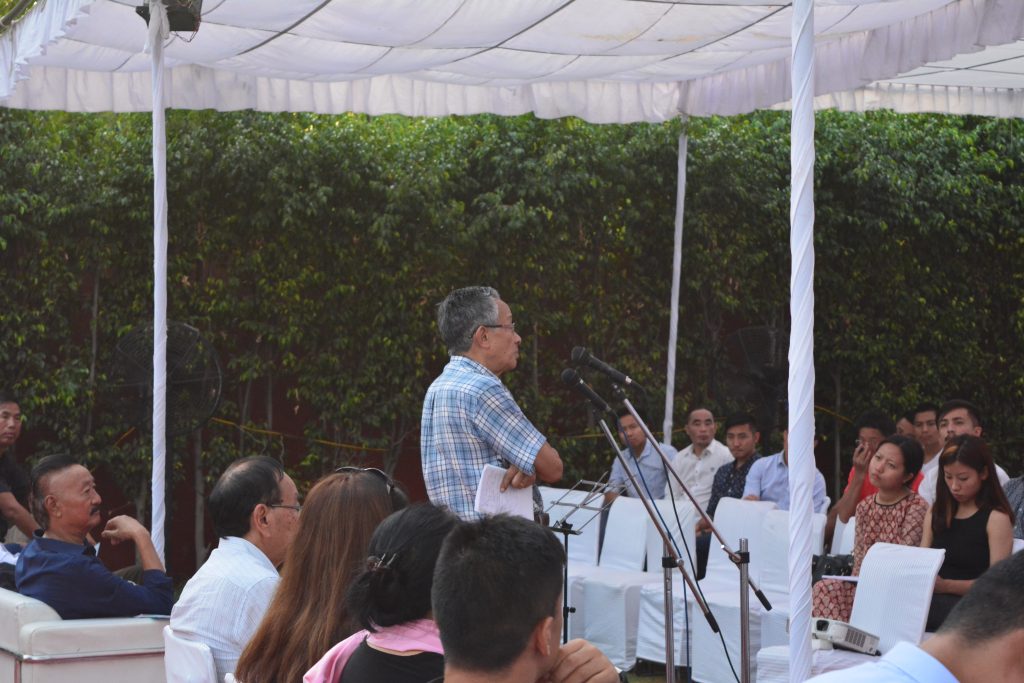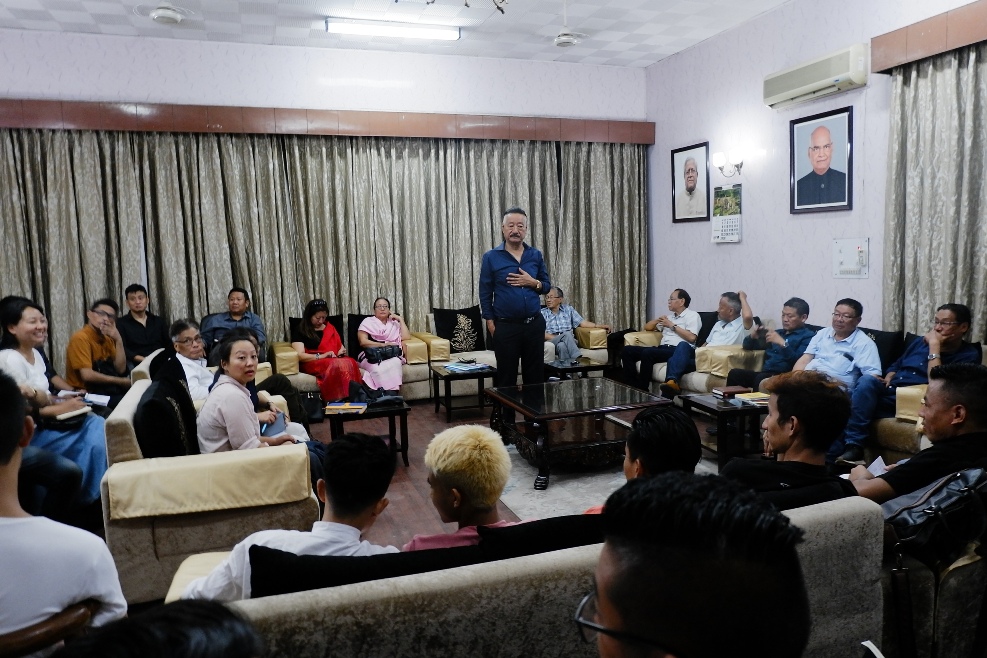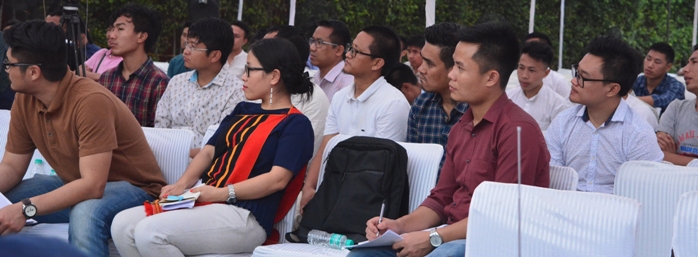Naga Republic News
The dark underbelly of Naga nationalism, Nagaland state politics, tribalism, socio-political parochialism were brought out to the surface as Nagas, young and old—making up the citizenry—engaged in a dialogue of truth telling and self-examination during the recent three-day long series of public interaction initiated by the Forum for Naga Reconciliation (FNR) at New Delhi.
Held over three days from May 4-6 including visitation to Naga churches around Delhi, the dialogue with church and civil society brought out the best as well as the worst of the Naga world.
The one hopeful discussion centred on Naga reconciliation and the need to pursue this for the common good yet this same hope was challenged by the intricacy surrounding the present state of affairs, described as ‘dysfunctional’ by none other than Naga elder and peace activist Niketu Iralu.
“The Naga struggle was the right thing to happen and as a people we should remain proud of our rights and aspiration. However the Naga struggle has also produced a dysfunctional society. We are in the ICU”, was what Iralu had to say.

Peace activist and FNR member Niketu Iralu speaks during the open public interaction held on May 4 at New Delhi
According to Iralu, ‘the journey has got into trouble and Nagas are presently confronting issues we never faced before’. “The present ills we are faced with including the abuse of money and power has become destructive to both under-ground and over-ground politics”, he said while adding that the FNR was ‘getting Nagas to re-examine themselves’.
“Unless we do that our society has become impossible to function. FNR is doing a bold thing for our society to change”, Iralu said.
Putting in perspective the work of the FNR and what it was trying to do, Iralu put it well when he said that ‘hurts not transformed are transferred’ and called for a collective endeavour to ‘restore the health of the current processes’ that were dysfunctional.
He also termed the present work of the FNR as very important for the Naga people and pointing out that ‘reconciliation is the only thing we have to do if we are to have a future’.
A lot of thought provoking questions were raised during the Delhi interactions. One participant wanted to know whether the FNR was playing the role of a facilitator or whether it was a ‘rallying point for the Naga factions’. Others wanted to know if media reports were true about the reported stand of the FNR that it was for ‘reconciliation’ first and ‘solution’ later.

FNR Convenor Rev Dr Wati Aier responding to queries during one of the interactive sessions on May 5 at New Delhi
Responding to these queries, FNR Convenor Rev Dr Wati Aier referred to some of the agreements arrived between the Naga Political Groups (NPGs) where the FNR was to play the role of a facilitator. In this regard the Convenor also clarified that the idea or proposal of a Naga National Government as mentioned in the Naga Concordant did not come from the FNR but it was the NPGs themselves who suggested this.
On the confusion whether reconciliation or solution should come first, the Convenor clarified the FNR’s position that both reconciliation and political solution were two sides of the same coin and the two were ‘parallel processes’.
Meanwhile giving a more in-depth understanding of FNR’s work so far, member Dr Akum Longchari pointed out that Nagas are being challenged by the question of reconciliation. “Is the shared Naga future possible without forgiveness and reconciliation?” he posed while also reaffirming that FNR’s work does not end with cessation of violence.
“We came to Delhi in the spirit of learning and to engage with our people on how we can work together as a community, be competent in who we are and what we can do and move together into the future with confidence”, Dr Longchari said.
Another FNR member Nepuni Piku observed that many Naga youths have seen only the negative aspect of the Naga struggle and therefore the younger generation should learn from the experience of Naga elders. He suggested more forums where ‘intergenerational dialogue’ may take place. He also informed that the present work of the FNR was to ‘redirect its attention towards the people’.
During one of the interactions, the FNR was specifically asked about the ‘challenges’ they faced in their journey so far.
“The first challenge was building trust and confidence. In the beginning some of the armed groups did not even want to fly in the same plane or stay in the same hotel room floor. Such was the trust deficit when we began”, the FNR Convenor recounted. Another challenge was the ‘negative public expectation’ built over many years of ‘past failures in peace initiatives’.
“The question of the past was also a big challenge. The hurts and acrimony of the past made it very difficult to move things forward”, according to Dr Longchari while further adding that the difficulties with language and communication posed its own problems.
The three-day public interaction discussed almost every-thing concerning the Naga state of affairs. From reconciliation to political solution, identity politics to justice there was even a question on the sensitive topic of Naga identity and citizenship.

A section of the gathering consisting mostly of Naga students and scholars during the public interaction on May 4 at New Delhi
“What is FNR’s position on dual citizenship”, queried a young student from Delhi University who hailed from a Naga tribe in present Manipur but settled in Nagaland. She expressed the difficulties she faced as a Naga from Manipur living in Nagaland. “Some people like us who are Nagas born in Manipur but settled in Nagaland are not considered real Nagas”, she said.
In response FNR member Dr Visier Sanyü said he was ‘ashamed’ to be from Nagaland if it was true that people there treated Nagas from other States as not real Nagas. “Boundary divides us emotionally, culturally and nationally. It is stupid for us to be fighting over our Naga identity when it was the colonial powers who divided us”, Dr Visier said.
On the important theme of justice, which drew quite a number of queries from the participants, Dr Pangernungba Kechu, member FNR said that it was very difficult to start the process of contextualising justice. However he suggested that ‘restorative justice’ is the way forward in the Naga context.
Dr Longchari likewise called for a ‘Naga jurisprudence on justice’ while admitting that there were no easy answers to the question of justice. “Justice is at the centre of Naga reconciliation. We need to recover our indigenous wisdom and values. We need to develop Naga jurisprudence on justice”, he maintained.
Another FNR member Rosemary Dzüvichü on the other hand pointed out that the current processes were not really looking at ‘gender-based justice’. “Is peace possible without justice for women? We still have a lot of work to be done”, she said.
Rosemary encouraged the young minds present at the interactions to ‘understand your history, come back to your homes, to your memories and to your history”. She also urged that Naga civil society and the public must support all national workers.
Dr Panger who chaired most of the group sessions described the FNR as a ‘voice in the wilderness’ who were ‘trying to make sense in a very difficult situation’. He said that the work and outcome of FNR’s work will also depend on how stakeholders responded.
While appreciating the FNR for its work so far, one participant pointed to a ‘disconnect’ between the public and what the FNR was trying to do. She also suggested that the FNR should ‘simplify’ its message and ‘give it a context’ for people to better grasp and understand. Still another suggestion was to change the format of interaction in a way that allows the public ‘to take responsibility and make it a truly people’s movement’.
The public interaction in New Delhi spanned over three days with the FNR team having an open interaction session on May 4 followed by separate sessions with the Naga Scholars Association (NSA), Naga Peoples Movement for Human Rights (NPMHR-Delhi), students from Jawaharlal Nehru University (JNU) and Delhi University (DU).
The FNR also met separately with the Naga Elders Forum Delhi, Eastern Nagas Union Delhi and Catholic community in Delhi. On May 6, FNR members spoke in ten churches and fellowships spread across the National Capital.
A total of 14 FNR members was part of the team that went to Delhi.
- Wati Aier, Convenor of FNR
- Abei-u Meru
- Pangernungba Kechu
- Rosemary Dzüvichü
- Aküm Longchari
- Henshet Phom
- PS Lorin
- Visier Sanyü
- Vashum
- Nepuni Piku
- Niketu Iralu
- Phughoto Aye
- Somipam Lungleng
- Phyobemo Ngully







 The Top Viral YouTube Videos of 2017
The Top Viral YouTube Videos of 2017 What Does Your Face Say About Your Health?
What Does Your Face Say About Your Health? An orbiting message of peace
An orbiting message of peace Meet R.N. Ravi, who is mediating peace with the Nagas
Meet R.N. Ravi, who is mediating peace with the Nagas










Leave a Reply
Your email address will not be published. Required fields are marked (required)